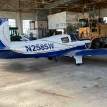Search the Community
Showing results for tags 'emergency'.
-
I'm thinking of putting together a small bag of tools to carry with me and was wondering, what would you suggest and why? Looking forward to cooler weather this fall
-
Very important So today i went out to plane and started it . Everything seemed perfect until I did my run up... all seemed good. But then the engine just quit. I put the boost pump on and the engine restarted. The it quit again....! If the engine did not stop i would never have known that i had a problem I stopped the plane to find out that fuel was pouring out the cowl flap. I would not have seen that or even known about that if i was in sitting in the plane. Now under another thread last week i asked about a flickering low fuel pressure gauge . Maybe that was the start of the problem or the first indication. And i suppose we all have different experiences but this is one i do not wish to repeat. But i actually dont know how you could know you had this problem I got out of the plane to find the gas flowing out of the cowling. I got the plane was operating I have no idea whether this plane would have had the power to take off with a failed engine driven fuel pump or if i would have hit the high boost while "on the roll"/ would it have had the power to take off I just dont know if i missed an indication of pending doom or not. last week i reported a very tiny ficker in the fuel gauge needle and discussed it here . Most thought it was normal. I had no fuel stain on the ground when i pulled the plane from the hangar and i did not have any hint of this issue. The mechanic pulled the cowling and confirmed that fuel was flowing from the engine driven fuel pump and the feeling is that when the fuel pump fails that it will just spit out gas and even more gas if you turn on the high boost pump Thank goodness i caught this on the ground. I had no indication and the only way i would know if i had a problem was if i saw fuel leaking ( not possible I'm in the plane ) or a zero fuel indication. Very scary Thoughts. Peter
- 41 replies
-
- failure
- engine driven fuel pump failure
-
(and 2 more)
Tagged with:
-
I had to declare an emergency the other day due to a mechanical issue. This is my first emergency since I got out of the Navy 38 years ago. I won't bore you with the details of the emergency, but I had to get the plane on the ground in a hurry and ATC couldn't issue me a clearance that would get me on the ground quickly (I was IFR in IMC). Everything worked out; I landed safely with no damage to me, my plane, or the airport. I called ATC once on the ground and told them I had landed and didn't need any further assistance. That's where the story begins: Shortly thereafter (amazingly quickly), I got a call from a FSDO inspector and was informed he was opening an investigation. That was about the last thing I wanted to hear right then. The investigation started with my statement, but progressed to the point where the inspector actually went out to my aircraft and watched while repair was done and the logs were signed off. Afterwards, the inspector followed up with an investigation into the repaired parts and who signed them off....this did not endear me to the people providing the repaired parts! After a period of time (it seemed like a long time), I was finally told that the investigation was closed and that no further action would be taken. You are probably wondering what sort of pilot gets this special attention. All I can say it that I have a 46 year clean record (about 29,000 hours). The only time I interface with the FSDO is to renew my CFI. It isn't like I have an emergency every week, violate airspace, and use bad language talking to controllers. I have always believed that declaring an emergency was a no-risk event and that as long as you didn't hurt anyone, or bend any aluminum, it was a non-event. Apparently that's not so. So, is this change? Has anyone else experienced this? Is this just a policy of this particular FSDO? Is this a new FAA-wide policy? Is this just a single, eager-beaver inspector? Obviously, there is some mechanism where ATC transmits information about emergency declarations to the FSDO. Won't this policy have a chilling effect on pilots declaring an emergency due to fears of an "investigation"?
-
1963 Mooney M20D Master Checklist View File Microsoft PowerPoint 1997-2003 file for my 1963 Mooney M20D. 180hp Lycoming O-360 engine, manual gear, cowl flaps, and hydraulic flaps. All information as per POH1188. Submitter Raptor05121 Submitted 09/07/2015 Category Safety & Techniques



